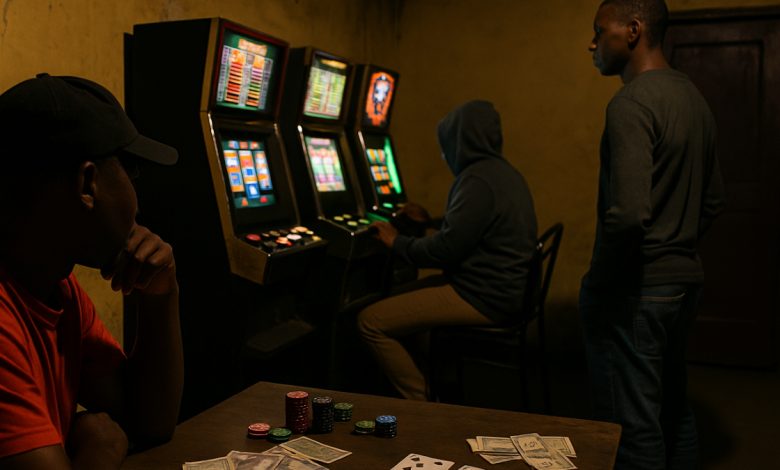Legal Gray Areas: Underground Gambling Networks in Gauteng and Their Risks

Gauteng’s legal gambling industry operates under tight regulation. However, a parallel underground gambling scene is rapidly expanding. These unlicensed operations thrive in backrooms and online spaces, targeting vulnerable individuals and avoiding legal oversight.
Because these networks operate in legal gray areas, they pose serious risks. Participants face financial loss, addiction, and even jail time.
ALSO READ: The Rise of Social Gambling Among Gauteng Youth: Trends, Risks, and Regulations
Understanding South Africa’s Gambling Laws
South African gambling laws stem from the National Gambling Act of 2004. This legislation requires all gambling—whether in casinos, betting shops, or online—to be licensed by a provincial board. In Gauteng, this role belongs to the Gauteng Gambling Board (GGB).
Only certain types of online gambling are legal. Sports betting and horse racing can be offered online through licensed operators. On the other hand, online casino-style games like poker and slots remain illegal. Although Parliament passed the 2008 Gambling Amendment Act to legalize interactive gambling, it was never enacted (Government Gazette).
Therefore, websites offering virtual casino games to South Africans—unless licensed for sports betting—violate national law.
How Underground Gambling Operates in Gauteng
Illegal gambling networks in Gauteng use both physical and digital platforms. For instance:
- They host games in taverns, backrooms, and homes.
- They run unlicensed betting apps or websites.
- They use cryptocurrencies or offshore servers to remain anonymous.
Because enforcement is limited, many of these operations function openly within communities. Their low entry barriers and fast-paced payouts make them attractive—especially to low-income gamblers.
Why Underground Gambling Is Dangerous
1. No Legal Protection
Players who get scammed by unlicensed operators have no way to recover their money. Since these operators don’t follow industry standards, they can manipulate outcomes or refuse payouts without consequences.
2. No Tools for Safe Gambling
Unlike licensed platforms, illegal networks don’t offer self-exclusion, spending limits, or gambling support services. Because of this, problem gambling often worsens.
3. Increased Youth Exposure
Minors are increasingly at risk. Many underground platforms skip age verification entirely, making it easy for underage users to sign up. According to The Star, gambling ads regularly appear during family-friendly TV hours, further normalizing the activity.
4. Risk of Financial Crime
The UN Office on Drugs and Crime (UNODC) warns that unregulated gambling is often linked to money laundering and illicit financial flows. While there’s no direct evidence of this in Gauteng, the risk remains high when funds move across anonymous digital platforms (UNODC).
5. Criminal Charges for Players and Operators
Participating in illegal gambling can lead to fines of up to R10 million or 10 years in prison. These penalties apply to both the person operating the site and anyone playing on it (G3 Newswire).
Weak Enforcement Makes the Problem Worse
Despite the legal restrictions, authorities struggle to shut down illegal networks. In fact, the Gauteng Gambling Board’s most recent report showed zero raids or equipment seizures in 2022–2023 (GGB). That number suggests a gap between regulation and enforcement.
Digital gambling presents an even bigger challenge. Since many illegal sites are hosted offshore or use encryption, local authorities can’t easily track them.
What South Africa Should Do Next
To reduce the risks of underground gambling, experts recommend a few key steps:
- Modernize the Law: Government must update gambling regulations to cover modern digital platforms and cryptocurrencies.
- Strengthen Technology Tools: Law enforcement agencies need better monitoring tools—such as AI and blockchain analytics—to detect illegal activity.
- Protect Minors: Authorities should enforce age verification more strictly and limit gambling ads during child-friendly programming.
- Educate the Public: Communities must understand the dangers of unlicensed gambling and where to find legal, safer alternatives.
MORE READ: The Psychology Behind Why Gauteng Gamblers Keep Coming Back: A Deep Dive
Final Words
Underground gambling networks in Gauteng are not just operating in the shadows—they are creating serious public and legal risks. By avoiding regulation, these networks endanger individuals, undermine consumer protections, and challenge law enforcement.
South Africans must remain aware. If you choose to gamble, always use licensed platforms, know the law, and seek help if gambling becomes a problem. The safer choice is always the legal one.



